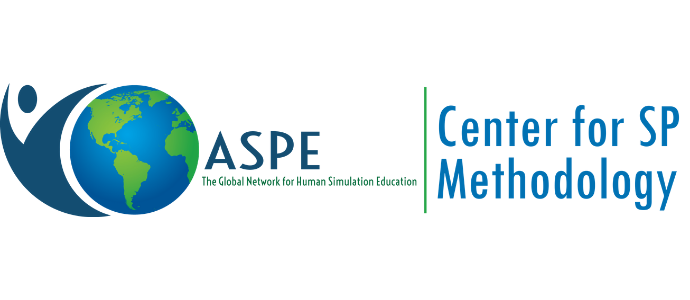Association of SP Educators
ASPE
222 S. Westmonte Drive Suite 111
Altamonte Springs, FL 32714
USA
p: +1 407-774-7880
f: +1 407-774-6440
 Course One: Fundamentals of SP Methodology Certificate ExamThe ASPE certificate exam for Course One: Fundamentals of SP Methodology has arrived!
ASPE has long been known for producing unique, engaging, and high-quality conferences, webinars, and community engagement opportunities, and members craved more!
ASPE is pleased to provide a new certificate examination as a tangible, quality member benefit to all who desire evidence of knowledge of the ASPE lesson material and ASPE’s Standards of Best Practice (SOBP). Successful completion of the certificate exam may be added to your CV or resume as proof to institutions and other stakeholders of your mastery of basic knowledge of SP methodology and application of the SOBP specifically related to the work of SP Educators. The ASPE certificate exam is the culmination of hours of volunteer committee efforts to keep ASPE members in the forefront of the field of SP methodology.
The evolution of ASPE lessons is iterative, as is the certificate exam. It is not meant to be an exhaustive measure of understanding. As more ASPE lessons are available, additions to the exam question bank will keep the exam robust, rigorous, and relevant.
Timeline of the Development Process
Many hardworking ASPE committee and board members were involved in launching the certificate examination. Thank you to all who have been, and continue to be, involved in this important member benefit initiative. There is still much to be done.
Here’s a synopsis of the development of the project:
Phase One – The ASPE SOBP, published in 2017, laid the foundation for the development of educational modules to support our defined standards, following the guidance of each domain and the overarching values. The clear, detailed, and practical guidelines were met with enthusiasm by ASPE members and the broader simulation community. This publication stimulated discussion about the need to expand member benefits to include more SOBP-based educational offerings.
As the SOBPs were being finalized, a Chinese affiliate partner, Tellyes, sponsored the authorship of presentations for their stakeholders in China. While a robust “Foundations Course” existed at our annual conference, it was largely developed and presented by individual ASPE members rather than representing formal, ASPE-curated materials. The ad hoc Tellyes Committee was formed, topics identified, and a call for authors was sent out to all ASPE members. The Tellyes Committee dedicated more than two years to the establishment of rigorous standards for screening, creation, documentation, and production of three solid educational courses on basic SP educator competencies, thanks to the rich author submissions.
Phase Two – The three Tellyes courses were piloted in the US and China, while ASPE leadership disseminated the presentations at other affiliate associations. The courses were met with a high level of approval and based on feedback from participants, adjustments were made to the courses that built a foundation for moving forward with additional topics and flexible time frames. Phase Three – Due to the time-limited nature of the ad hoc Tellyes Committee, another ad hoc committee was formed, dedicated to keeping the production of educational modules moving forward. The ad hoc Modules Committee was charged with advancing and expanding the reach of the materials by consolidating existing work and identifying additional topics to develop. Additional topic areas were identified by the consensus opinion of a team of ASPE experts. ASPE members were again invited to submit “presentation modules” per topic. These submitted materials were vetted, reviewed, and piloted at the ASPE 2019 conference, in a very popular pre-conference setting. After receiving valuable feedback from attendees, the modules were finalized by the leadership of the Modules Committee. Discussion of building these educational modules into an online lesson platform began, as ASPE members who could not attend the annual conference requested access to this learning opportunity. Members told ASPE leaders they craved more professional development resources outside of the annual conference.
Phase Four- ASPE’s online Learning Management System (LMS) was growing just as plans for an online learning platform were making headway. The LMS already housed a wide array of webinars and materials submitted by members for shared use. As COVID impacted the projected future of ASPE, leaders adjusted the plan for the vetted modules to meet the online learning needs of our members. We asked the module authors to partner with us to create online presentations that could be shared free of charge with ASPE members on our LMS platform. The generosity of ASPE members in sharing knowledge and experience at our annual conference is well known, and we want to give thanks to the authors of these virtual offerings now available anytime to every ASPE member.
In this virtual space, we seek to fulfill the foundation of the ASPE mission by disseminating best practices, advancing professional knowledge, and promoting the application of SP methodology.
|